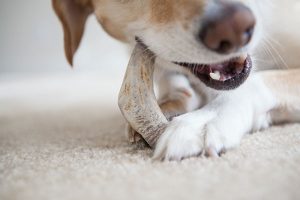Are Bones Safe for My Dog?
 Dogs love chewing on bones. Bones and chewing products are designed to keep your dog busy, clean the teeth, freshen the breath, or help with teething discomfort. But, which bones will cause health problems and which are safe for your dog to enjoy? Every dog’s chewing behavior and strength is different but, in general, here are some good guidelines to follow, as well as recommendations from veterinary dentists.
Dogs love chewing on bones. Bones and chewing products are designed to keep your dog busy, clean the teeth, freshen the breath, or help with teething discomfort. But, which bones will cause health problems and which are safe for your dog to enjoy? Every dog’s chewing behavior and strength is different but, in general, here are some good guidelines to follow, as well as recommendations from veterinary dentists.
When it comes to left over bones from a roast, ham or steak, it doesn’t matter how large the bone is, bones are unsafe no matter what their size. We recommend disposing of your bones in a way that your dog cannot access them. Always pay attention to what your dog is coming in contact with when walking around the neighborhood or parks. Bones from deceased animals can be just as dangerous. Here are eight reasons why bones are bad for your dog:
1. Oral injuries and broken teeth: Bones are sharp and can cause tears in the gum tissue or tongue. Bones, antlers and hooves are also extremely hard, most are even harder than teeth. If your dog is a strong chewer, he can break off his teeth or chip his teeth on the bones. Hard Nylabones will also cause teeth to break, not to mention getting stuck in the stomach and requiring surgery.
2. Bones can get stuck around the lower jaw: This can be frightening and painful to your dog and usually requires sedation to remove.
3. Bones get stuck in the esophagus: Your dog may start gagging and will be unable to swallow. This can be very uncomfortable and requires immediate attention and often surgery.
4. Bones get stuck in trachea: If your dog accidentally inhales a small enough piece of bone, he will no longer be able to take in enough air. This is an emergency situation.
5. Bones get stuck in the stomach or in the intestine and cause blockage: If the bone pieces are not small enough to move through the intestines, it may require surgery to remove them. Corn cobs are another dangerous “treat” that will often result in an intestinal blockage. Knotted raw hide bones and rope toys may seem like they stand up to the vigorous chewers but, often large pieces of rawhide or strings of rope are swallowed and lodge in the intestines.
6. The meat around or inside the bones (marrow) can cause stomach upset and diarrhea: The marrow inside bones is primarily fat which can cause intestinal inflammation and diarrhea. The tissues attached to raw bones can carry bacteria, like E.coli or Salmonella, which can make you and your dog very sick.
7. Bone fragments can cause constipation and pain: Bone fragments are often very sharp and as your dog is trying to pass them, they will scrape along the sensitive lining of the rectum and cause pain and bleeding.
8. Peritonitis: Bones are extremely brittle and when chewed on, will break off into smaller, sharp fragments. These fragments can perforate through the esophagus, stomach or intestines leading to infection within the abdomen or chest. This difficult to treat bacterial infection requires an emergency visit to the veterinarian because peritonitis is life-threatening.
Ask your veterinarian at Northwest Animal Hospital in Plymouth about safe chew toys for your dog. General recommendations include Kong toys, Busy Buddy toys and enzyme dental rawhide chews. Look for the Veterinary Oral Health Council (VOHC) seal of approval on chew toys. The VOHC has a rigorous approval process for chew toys that require the product to be safe and effective for keeping your pet’s teeth healthy.



